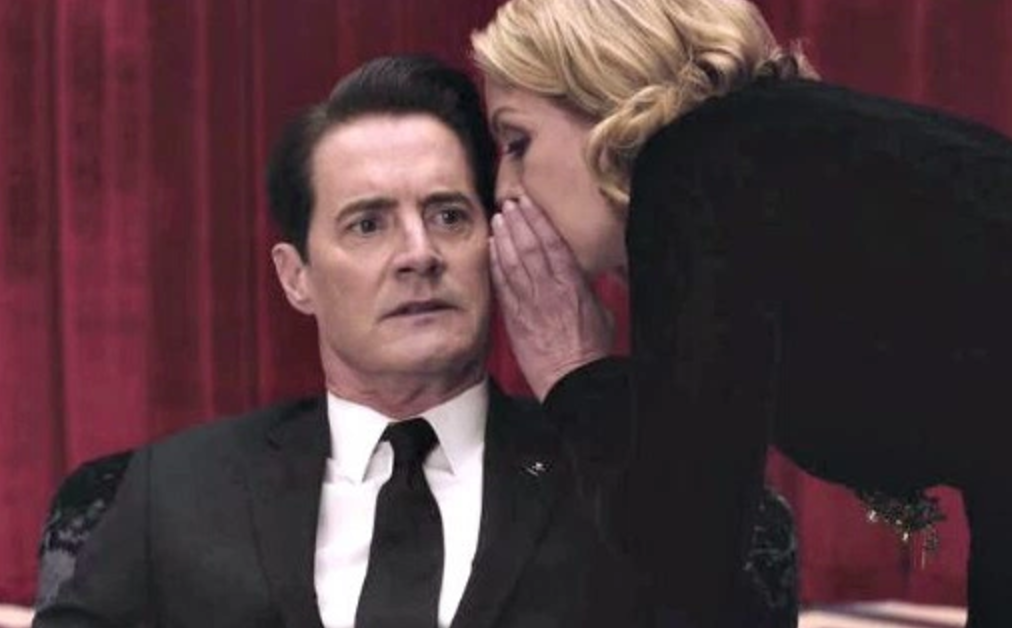“If there’s one thing you should know about me, Ray, it’s that I don’t need anything. I want.” So reminds Dale Cooper (Kyle MacLachlan) in his diabolical doppelganger form, speaking both of the black hole of evilness within himself and the American people. Those who have been nervous about the reboot, Twin Peaks: The Return, admittedly, have every right to be. For while David Lynch and Mark Frost have maintained the integrity of the original, there is something undeniably ersatz about it, like Dougie Jones, the “manufactured” portal through which the original Dale must re-enter the normal world. Though there’s really nothing normal about that either, as particularly evidenced by a subplot involving a clear glass box in New York City that is guarded 24/7 by an unassuming melba sort of man in his 20s who ends up getting tempted and therefore distracted by a coffee-toting Calypso type named Tracey.
Hard to watch for a number of reasons, including the absorption of the fact that both the Log Lady (Catherine E. Coulson) and Albert (Miguel Ferrer) have since died IRL, the first four episodes alone prove that the higher the budget and the fewer the limitations on Lynch, the more meandering he becomes. This is clearly why some have been comparing the style to Mulholland Drive, not least of which one is reminded of upon seeing Naomi Watts as Janey-E Jones, Dougie’s wife. In further parallels between the two Watts/Lynch collaborations, Watts’ dual character of Betty/Diane Selwyn in Mulholland Drive also, like Janey-E, must care for an amnesiac and his bag full of cash. Of course, neither she nor anyone else who has interactions with “Dougie” seems to care that he’s acting, well, to put it politely, like a dolt. In fact, anyone interacting with him would, logically, direct him to a hospital for his overt head injury–repeating words and phrases back to people, that blank stare. In any case, no one is the wiser about the sudden replacement of Dougie with Dale–not even seeming to mind the new and improved (physically at least) Dougie having a slimmer waistline and a better haircut. Meanwhile, though Cooper’s evil doppelganger was supposed to go back into the Black Lodge (he’s had his damn twenty-five years, now it’s time to pay the piper–though no one knows who that is–and return), he manages to find a vomiticious loophole that allows him to remain. Unfortunately, this presents one of those space-time continuum issues that leaves us with the ultimatum: one of the Coopers in the real world must die.
Lynch, who has always excelled best when pairing the simultaneous beauty and macabreness of American life together through his tailored visuals and semiotics, additionally draws from the aesthetic of Blue Velvet–Lynch’s first major statement on the sinister underbelly of Americana–with performances at the end of each episode from the likes of The Chromatics and Au Revoir Simone at a bar called, in typical Lynchian fashion-Bar Bang Bang (with flickering gun logo, to boot). Elsewhere, the head injury scene seems to abound with James Hurley (James Marshall) showing up at Bar Bang Bang where he stares at Shelly (Mädchen Amick) from across the room, who vouches that he just acts strangely because he was in a motorcycle accident.
But more jarring than any unexpected new information about a beloved character from the original series is Michael Cera as Wally Brando, the semi-dim spawn of Lucy Moran (Kimmy Robertson) and Andy Brennan (Harry Goaz). This is one of the many scenes throughout the first four episodes alone that makes the reboot feel like something else entirely, not necessarily Twin Peaks so much as some mutant hybrid of all of Lynch’s work splashed with a dash of Paul Verhoeven. But then, the Twin Peaks series has never been that oversimplifiable. It means so many different things to each viewer, and the way a person watches and interprets it is almost more telling of their own nature than the show’s underlying meaning–of which there is infinite supply.
So, once again to quote from doppelganger Dale, “You follow human nature perfectly.” And that is what Lynch has done in banking on his devoted fanbase; not just that they’ll watch whatever he puts out, but that they won’t question the “why” behind his oft inexplicable–even to him–plot points. Rather, they have learned that a better way to appreciate the director’s work is to let it wash over you, usually entailing that feeling of both appreciation and disgust for all that modern Americana has come to symbolize.






















